I'll be honest. I almost didn't even bother to watch the third season of Star Trek: Picard. The first 2 seasons were so bad that the thought of watching another season almost made me physically ill. It was bad enough to have beloved characters like Picard, Seven of Nine, Hugh, and Q treated the way that they were, but now season 3 threatened to treat the entire cast of Next Generation with the same level of disrespect. It was not something that I wanted to willingly subject myself to.
Even after I saw some positive reactions to the first couple episodes, I still didn't bother watching. After all, the first episode or 2 of both of the previous seasons received generally positive reviews before nose-diving off the deep end into a pool of shit. But then the season reached the halfway mark, and I was still seeing almost entirely positive buzz surrounding it -- and not just from a few shill social media influencers, but from pretty much everybody. At that point, my partner started expressing interest in watching it, so I finally caved and started watching, with a bottle of Excedrin next to me, just in case.
I kept my guard up throughout the first few episode. I fully expected that it would start off relatively strong before inevitably tripping over its own 2 feet. But that kind of ... never really happens this time around. Yes, there is a big "mystery box" tease throughout the show that had the hallmarks of J.J. Abrams and Alex Kurtzman plastered all over it, and that had me very worried for where things would end up. And yes, that mystery box does turn out to be a contrived 11th-hour bait-and-switch.
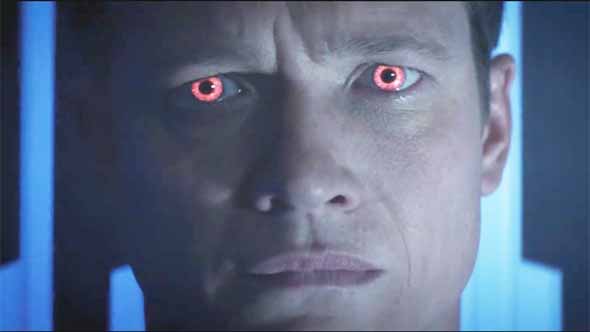 © CBS, Paramount
© CBS, Paramount
The "Mystery Box" of Jack Crusher had Alex Kurtzman's fingerprints all over it.
But even though the bait-and-switch plot-twist ends up being about as silly as anything that was in the previous 2 seasons, this one actually kind of works. It's something that is actually quite clearly telegraphed throughout the entire show, starting from the opening scenes. But it also has some clever mis-direction and red-herrings to keep the twist from ever feeling truly certain. And instead of being something pulled out of the writers' asses (like robot tentacle-monsters from another dimension), this twist is something that is both firmly grounded in Star Trek history and lore, and which logically follows from previous series.
It's almost like the people who wrote this season of Picard actually, like, I don't know, watched some episodes of Star Trek before coming up with this plot.
It ends up making a world of difference. I'm still not "in love" with Star Trek: Picard season 3. I don't think it is particularly great "Star Trek". It still falls firmly into the category of "Dark Trek", and is still about vengeful bad guys with super-weapons. But it is at least competently-plotted and scripted this time around. It is tightly themed, is loaded with set-ups and pay-offs, and shows our characters growing an changing in ways that are consistent with their original characterizations. Season 3 of Picard is basically an extended Next Generation movie, and it's definitely better than Nemesis, and probably at least as good as any of the other Next Generation movies (keeping in mind that I'm not a big fan of First Contact).
Aside from the finale, it's generally restrained with regard to massive space battles. In fact, a lot of the drama and tension comes from our heroes actively trying to avoid confrontation, but the enemies keep finding and backing them deeper and deeper into a corner. There's even a whole episode that is about the crew trying to solve an extended scientific and engineering problem, and a few instances of the characters sitting around a conference table to discuss how to solve their current predicament. These scenes and episodes (with different contexts and stakes) would have felt right at home as episode of TNG. Think of something along the lines of TNG's "Booby Trap" or "Time Squared".
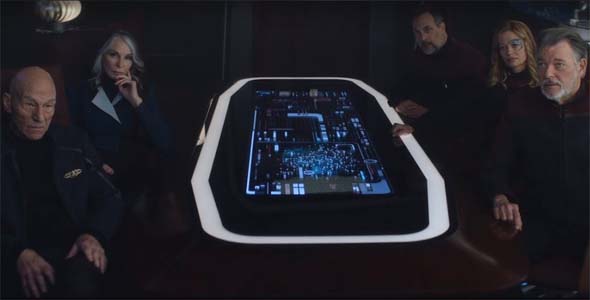 © CBS, Paramount
© CBS, Paramount
The crew sits around a conference table to discuss a science or engineering problem!
Season 3 still suffers from some of the pacing and editing problems that are inherent to these streaming shows, but not nearly to the level of the previous 2 seasons. And it's also still oppressively dark. And I mean "dark" in a literal, visual sense; not in a thematic sense. Though it's pretty dark, thematically, too. I mean that the sets are just too dimly lit and gloomy.
I loved Star Trek because it depicted a future that I would want to live in. I wish that I could live and work on a starship like the Enterprise, exploring the frontiers of space and probing at the limits of human comprehension of the cosmos. But these dark, dimly-lit sets of "New-Trek" are not a place that I would want to live and work. I don't expect the sets to have perfectly-even 90's television show lighting. There can be some shadows. But the bridge should not look like it is entirely lit by a a couple emergency lights and the glow of computer monitors. Turn on some overhead lights, already!
I think that's about as much as I can say without major spoilers. So if you want a spoiler-free recommendation for Picard season 3 from a life-long Trekkie and outspoken critic of pretty much the whole franchise since the end of Deep Space Nine, then here it is. Keeping in mind that the bar has been set extremely low by Discovery and the first seasons of Picard, season 3 does manage to lift itself up over that bar by meeting reasonable expectations for competency in writing, style, and characterization. As I said before, it's on-par with any of the TNG movies and basically works as a direct continuation to those movies. I hesitate to call it "good", because I don't know how well it's going to hold up over the long run, but it is certainly competent. This is basically what Star Trek: Picard probably should have been all along.
Now I'm going to get into heavy spoilers, so feel free to stop reading.
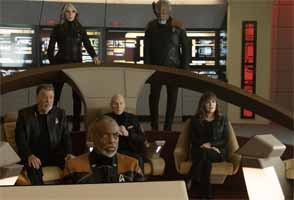 © CBS, Paramount
© CBS, Paramount
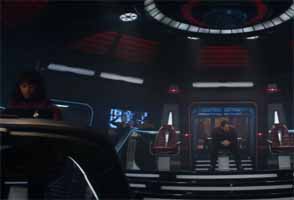 © CBS, Paramount
© CBS, Paramount
This recreation of the Enterprise bridge is clearly and evenly-lit; why can't the other bridges be this well lit?
Nostalgia and fan service
Needless to say, season 3 of Picard makes very explicit attempts to right many of the wrongs of the previous seasons of Picard, and also even tries to fix some of the dumb decisions made for the Next Generation movies -- particularly Nemesis. It does this by leaning very hard into nostalgia and fan service. But it manages to execute its fan service in ways that are (mostly) not offensive. Very little of the fan service is cringe-worthy or superfluous. It's all in service of the story.
There is a reason for why each of the various TNG cast members return. And that reason goes beyond simple, hand-wavy excuses like "you're the only one(s) I can trust."
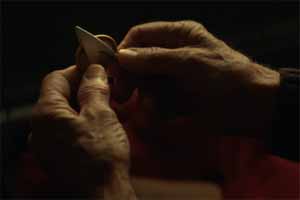 © CBS, Paramount
© CBS, Paramount
Beverly tells Picard to "trust no one", but then
sends him a coded message he can't decipher alone.
Well, that is true for almost every returning TNG cast member. The one real exception is probably the very first character to be recruited: Riker. And this is probably one of the dumber plot points of the whole season. Beverly sends a secret message to Picard, along with instructions to "trust no one" (because she knows that anybody could be a Changeling infiltrator). But yet her message is coded with a cipher that she knows Picard won't recognize or be able to decipher, because it was a code that the rest of the Enterprise senior staff encountered while Picard was assimilated by the Borg. So he has to immediately discard the "trust no one" advice, and go straight to the first member of the Enterprise's senior staff that he can track down: Riker.
But after that, the show provides fairly convincing reasons for the appearance of all the other characters. Worf alludes to having been warned by Odo (who is still in the Great Link) about the rogue Changelings. Geordi has become the curator of the Starfleet fleet museum, and has access to out-of-service Starfleet ships that Starfleet may not be able to track as easily as they can track the Titan. Deanna is held hostage by Vadic to try to manipulate Riker. And, of course, Beverly is the inciting incident for the entire story.
Data's resurrection is a little bit more far-fetched, and I actually prefer the idea of Data, B-4, and Lore's remains being in a research institute, as opposed to a military black-site. That being said, I do like the whole memory sequence between Data and Lore.
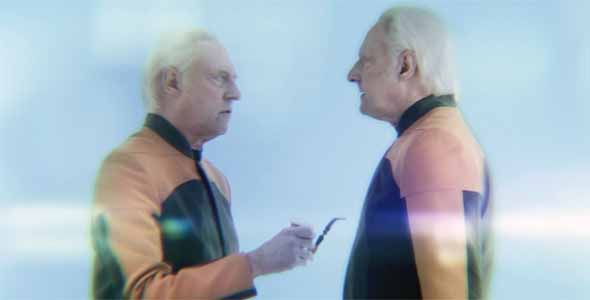 © CBS, Paramount
© CBS, Paramount
Data's resurrection is a bit gimmicky.
The old cast isn't brought back solely for nostalgia either. Nobody just shows up, stands next to the others for a "hero shot", and then disappears into the background. In addition to everyone having a reason for being present, they are also all given something important to do that moves the plot forward. Even Deanna Troi has an important function! And no, I'm not just talking about the "damsel in distress" plot point. She actually has something else to do as well. Any time a TNG writer can find a useful thing for Troi to do, that is saying something!
Heck, even the cameo appearances from the likes of Tuvok and Ro Laren are purposeful. Tuvok being exposed as a Changeling really does help to up the stakes and emphasize the fact that the TNG cast (and Seven) really cannot trust anybody.
And even though I was still sad to see Ro Laren killed off, at least she dies for a reason. It isn't a bull-shit senseless death done purely for shock value, like what poor Hugh was given in season 1. Callously murdering Hugh for no good reason is something that I will never be able to forgive season 1 for! And considering that season 3's writers un-did the previous seasons' blunders by resurrecting both Data and Q, I was disappointed that they didn't find an excuse to resurrect Hugh as well. Maybe we could have found him, alive, at Daystrom Station, along with Data?
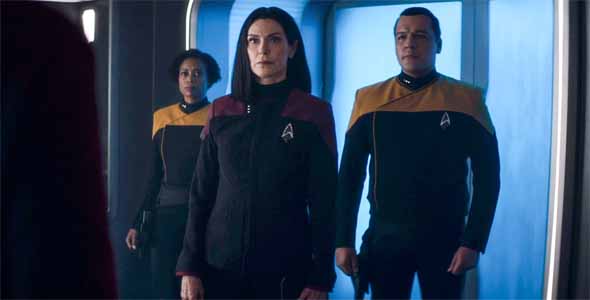 © CBS, Paramount
© CBS, Paramount
Ro Laren was a pleasant surprise, and at least her death has some meaning.
And to throw salt in the wound, season 3 even goes ahead and blows up the Excelsior, which presumably kills Elnor our of sheer spite for the previous seasons.
The purposeful nostalgia bait doesn't end with the characters either. There is even a story reason for why the crew has to return to the Enterprise-D. Granted, the excuse for restoring the crashed ship is a more hand-wavy "because I wanted to". They needed an older ship that isn't part of the fleet-wide A.I. network, so they go to the Enterprise-D. I will concede that I think that the whole "Fleet Formation" thing is a stupid concept on its face. The assimilated crews taking manual control of the fleet is reason enough for the entire fleet to attack Earth. The extra "Fleet Formation" A.I. thing only exists to give an excuse for why they need the older Enterprise. But at least the writers give an excuse. It isn't like Rey and Finn pulling the Millennium Falcon out from under a tarp in pure coincidence.
"It's about family"
I also want to point out that I've heard so many interviews with the cast of these new shows saying that the shows are "about family". It's usually bullshit. But this time, season 3 actually is heavily themed around family. It's about tension and conflict within romantic or familial relationships, primarily induced by poor communication, lack of communication, or emotional distance between the partners. This applies to both Picard and Crusher, and also Troi and Riker. And it also applies, to an extent to Raffi's separation from her own family.
But then there's also the angle of children and their estranged fathers. Picard is first meeting his son, despite his son being over 20 years old. Riker is dealing with the consequences of his own grief regarding the death of his son. Geordi has to confront his daughter's sense of frustration with Geordi's expectations for her career. With all the estranged children and parents, I'm surprised that there wasn't even a mention of Worf's relationship and history with his son, Alexander. But I guess Worf is such a monumentally bad father, that the baggage between him and Alexander would overwhelm the entire show and probably blow an EPS conduit somewhere.
 © CBS, Paramount
© CBS, Paramount
Most of the characters are dealing with family issues.
And then even Data has a little conflict with his brother, Lore. Every character has some family baggage that they bring into this season, and which they have to confront.
They even become trapped in an anomaly that turns out to be a pregnant space organism giving birth to little space-squid babies, which also ties into the themes of family and parenthood. I'm honestly surprised that the writers didn't extend that themes of family or parenthood to the villains. Vadic could have seen herself as a parental figure (either literal or figurative) to the other Changelings, and the Borg Queen could have made some hand-wavy gestures towards Jack and all the assimilated Starfleet crews being her adopted "children". But the writers missed those opportunities to try to tie the villains into the broader theme.
That being said, at a more abstract level, season 3 can also be seen as being about our inherent desire to find connections with other people -- whether they be family, friends, or colleagues. In that sense, both the Changelings and Borg are perfect avatars for that theme. Both the Changelings and Borg seek out a hive mind with their brethren. In that sense, the villains are actually seeking out connections and surrogate family, just as the heroes are. This also extends, to a certain degree, to Captain Shaw, who acts as a pseudo-antagonist in the first few episodes. His bitterness and cynicism derives from his own survivor's guilt and the loss of his old crew in the Battle of Wolf 359.
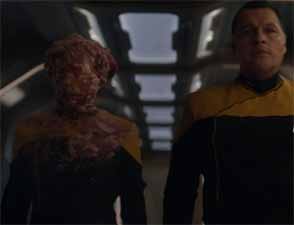 © CBS, Paramount
© CBS, Paramount
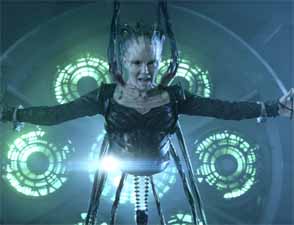 © CBS, Paramount
© CBS, Paramount
Changelings and Borg are both good villains for a story about finding connections and trusting people.
And this is what I mean by the season being "competently plotted". It clearly presents its themes throughout the entire season, and those themes influence the archs of almost all the characters. Unlike the first 2 seasons, I didn't walk away from season 3 of Picard wondering "what the hell was the point? What was all of this even about?". It's actually about family, and connections. This isn't just nostalgia bait. There's an actual story here.
This theme of family and connections is also presented a bit more optimistically than the previous seasons of Picard as well. All the heroes overcome their familial estrangements and make amends. It's a hopeful and optimistic conclusion. It isn't like the first 2 seasons, which showed pessimistic visions of the future -- a future in which the Federation is just as racist and xenophobic as America is now, and in which even in the 24th-century Federation, people still don't have access to adequate mental healthcare. So in that sense, season 3 also feels a lot more in-line with the forward-thinking, optimistic tone of Star Trek. It's certainly no Undiscovered Country, but it isn't as miserable, depressing, and futile as the first season of Discovery and Picard.